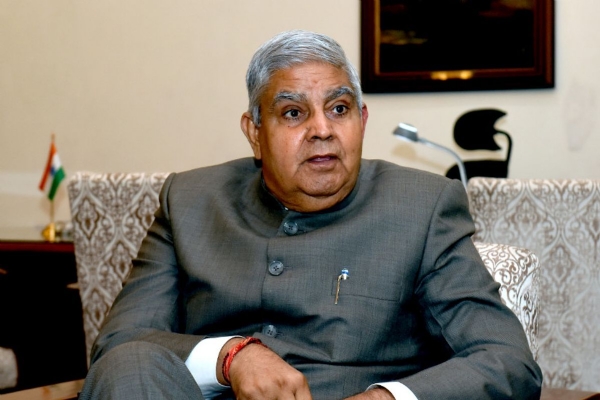VP Dhankar enters collegium system debate, slams SC in presence of CJI for junking NJAC Act
His remarks come days after Union Law Minister Kiren Rijiju questioned the Collegium system of judicial appointments, calling it “opaque” and “alien”. The Minister’s remarks attracted the displeasure of the Supreme Court earlier this week.

Though the Vice-President did not explicitly name the Constitutional amendment, his reference was to the now repealed National Judicial Appointments Commission (NJAC) through the 99 Amendment.
His remarks come days after Union Law Minister Kiren Rijiju questioned the Collegium system of judicial appointments, calling it “opaque” and “alien”. The Minister’s remarks attracted the displeasure of the Supreme Court earlier this week.
“In the year 2015-16, the Parliament was dealing with a Constitutional amendment Act and as a matter of record, the entire Lok Sabha voted unanimously. There was no abstention and no dissension. And the amendment was passed. In Rajya Sabha it was unanimous, there was one abstention,” Dhankhar said.
What is NJAC ( National Judicial Appointments Commission)
It should be noted that with an aim to replace the Collegium system, NJAC was passed unanimously in the Lok Sabha, Ram Jethmalini, an independent member of the Rajya Sabha, had abstained in the Upper House. It was formed for the appointment of judges in the SC and HCs, on grounds that it would undermine the independence of the judiciary. However, the NJAC was struck down as unconstitutional by the Supreme Court in October 2015.
“Please find out a parallel in the world where a Constitutional provision can be undone. Our Indian Constitution provides in explicit terms Art 145 (3). Interpretation of the Constitution when a substantial question of law is involved can be done by the court. Nowhere it says that a provision can be run down,” he said, adding, “I am startled that after this verdict, there was no whispering in the Parliament. It was taken as such. This is too serious an issue”.
Dhankhar added that in a democracy, “the basis of the basic structure is the primacy of the will of the people”.


